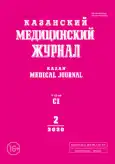Causes of hypocalcemia after thyroid surgery
- Authors: Hummatov AF1, Abbasov AH1, Ismayilov AK1, Gasymov EM1
-
Affiliations:
- Azerbaijan Medical University
- Issue: Vol 101, No 2 (2020)
- Pages: 206-211
- Section: Theoretical and clinical medicine
- URL: https://journal-vniispk.ru/kazanmedj/article/view/26275
- DOI: https://doi.org/10.17816/KMJ2020-206
- ID: 26275
Cite item
Full Text
Abstract
Aim. To identify the causes affecting hypocalcemia and its frequency of causing after thyroidectomy.
Methods. The study included 402 patients after thyroidectomy, 361 (89.8%) women and 41 (10.2%) men, for the period 2015–2019. The patients were between the ages of 14 and 77 years (average 45±27.2 years). Patients were tested for the presence of hyperthyroidism, the volume of tissue removed and type of thyroidectomy, presence of repeated thyroid operations and accidental parathyroidectomy, the results of parathyroid autotransplantation and pathohistological reports. To determine the effect of these factors on hypocalcemia, patients were divided into three groups. The first group included patients (n=51, 12.7%) were underwent surgery for Graves’ disease, the second (n=335, 83.3%) — for nodular goiter, and the third (n=16, 4%) — for recurrent goiter. Statistical data analysis was performed with IBM SPSS 16.0. The results were analyzed by one-way analysis of variance or Kruskal–Wallis test and the median test. Results were considered statistically significant at p <0.05 (two-sided criterion).
Results. In the early postoperative period, 20 (5%) of 402 patients had hypocalcemia, of which 12 (3%) had transient hypocalcemia, and 8 (2%) had permanent hypocalcemia. Postoperative hypocalcemia was detected in 9 (17.6%) patients the first group, 8 (2.4%) patients — in the second group, and 3 (18.8%) patients of the third group. Patients’ hypocalcemia was characterized based on the types of underwent operations as follows: in 14 (5.3%; p <0.05) patients after total thyroidectomy, in 1 (3.2%) patient after close to total thyroidectomy, in 1 (16.7%) patient after total thyroidectomy with central lymphatic dissection, in 1 (20%) patient after total thyroidectomy with central and lateral lymphatic dissection, in 3 (18.8%) patients after repeated surgery. Postoperative hypocalcemia was identified in 5 of 44 patients of the second group with thyroid carcinoma, as well as in 1 patient of the third group with the same pathology (p=0.246).
Conclusion. Incidence of hypocalcemia was more frequent after surgery for hyperthyroidism, especially after total thyroidectomy; in 40% of cases, transient hypocalcemia was identified in patients with autotransplantation of the parathyroid gland after an accidental parathyroidectomy.
Keywords
Full Text
##article.viewOnOriginalSite##About the authors
A F Hummatov
Azerbaijan Medical University
Author for correspondence.
Email: rjafarova@bk.ru
Azerbaijan, Baku, Azerbaijan
A H Abbasov
Azerbaijan Medical University
Email: rjafarova@bk.ru
Azerbaijan, Baku, Azerbaijan
A K Ismayilov
Azerbaijan Medical University
Email: rjafarova@bk.ru
Azerbaijan, Baku, Azerbaijan
E M Gasymov
Azerbaijan Medical University
Email: rjafarova@bk.ru
Azerbaijan, Baku, Azerbaijan
References
- Karamanakos S.N., Markou K.B., Panagopoulos K. et al. Complications and risk factors related to the extent of surgery in thyroidectomy. Results from 2,043 procedures. Hormones (Athens). 2010; 9: 318–325. doi: 10.14310/horm.2002.1283.
- Baldassarre R.L., Chang D.C., Brumund K.T., Bouvet M. Predictors of hypocalcemia after thyroidectomy: results from the nationwide inpatient sample. ISRN Surg. 2012; 2012: 838614. doi: 10.5402/2012/838614.
- Lombardi C.P., Raffaelli M., De Crea C. et al. Complications in thyroid surgery. Minerva. Chir. 2007; 62: 395–408. doi: 10.1016/j.amjsurg.2009.12.020.
- Öztürk G., Akçay M.N., Basoğlu M. et al. Thyroidectomy for benign thyroid disease in patients with advanced ages: clinical experience. Endokrinolojide Diyalog. 2009; 6: 14–18. doi: 10.5505/kjms.2017.82542.
- Pradeep P.V., Ramalingam K. Postoperative PTH measuments is not a reliable predictor for hypocalcemia after total thyroidectomy in vitamin D deficiency: prospective study of 203 cases. World J. Surg. 2014; 38 (3): 564–567. doi: 10.1007/s00268-013-2350-9.
- Lazard D.S., Godiris-Petit G., Wagner I. et al. Early detaction of hypocalcemia after total/completion thyroidectomy: routinely usable algorithm based on serum calcium level. World J. Surg. 2012; 36 (11): 2590–2597. doi: 10.1093/bja/aex163.
- Zenkova A.V. Status of parathyroid glands functon before and after thyroid surgery. Vestnik OQU. 2010; (6): 74–77. (In Russ.)
- Pesce C.E., Shiue Z., Tsai H.L. et al. Postoperative hypocalcemia after thyroidectomy for Graves’ disease. Thyroid. 2010; 20 (11): 1279–1283. doi: 10.1089/thy.2010.0047.
- Biet A., Zaatar R., Strunski V. et al. Postoperative complications in total thyroidectomy for Graves’ disease: comparison with multinodular benign goiter surgery. Ann. Otolaryngol. Chir. Cervicofac. 2009; 126: 190–195. doi: 10.1016/j.aorl.2009.06.003.
- Thomusch O., Machens A., Sekulla C. et al. The impact of surgical technique on postoperative hypoparathyroidism in bilateral thyhroid surgery: a multivariate analysis of 5846 consecutive patients. Surgery. 2003; 133: 180–185. doi: 10.1067/msy.2003.61.
- Yetkin E., Makay Ö. Tiroidektomi komplikasyonları: Genel bakış. In: İşgör A., Uludağ M. (eds). Tiroid. 1. Baskı. İstanbul: Nobel Tıp Kitabevleri Tic. Ltd. Şti. 2013; 941–954.
- Prazenica P., O’Driscoll K., Holy R. Incidental parathyroidectomy during thyroid surgery using capsular dissection technique. Otolaryngol. Head Neck Surg. 2014; 150: 754–761. doi: 10.1177/0194599814521365.
- Uludağ M., Besler E., Aygün N. et al. The factors affecting the occurance of hypocalcemia after thyroid surgery. The Medical Bulletin of Şişli Etfal Hospital. 2015; 49 (2): 101–106. doi: 10.5350/SEMB.20140810100328.
- Erbil Y., Barbaros U., Temel B. et al. The impact of age, vitamin D(3) level, and incidental parathyroidectomy on postoperative hypocalcemia after total or near total thyroidectomy. Am. J. Surg. 2009; 197: 439–446. doi: 10.1016/j.amjsurg.2008.01.032.
- Shulutko A.M., Semikov V.I., Qryaznov S.E. et al. Risk of hypocalcemia after thyroid surgery. Hirurqia. 2015; (11): 35–40. (In Russ.) doi: 10.17116/hirurgia20151135-40.
- Chao T.C., Jeng L.B., Lin J.D., Chen M.F. Reoperative thyroid surgery. World J. Surg. 1997; 21: 644–647. doi: 10.1007/s002689900287.
- Lefevre J.H., Amiot A., Joly F. et al. Risk of recurrence after surgery for chronic radiation enteritis. Br. J. Surg. 2011; 98 (12): 1792–1797. doi: 10.1002/bjs.7655.
- Menegaux F., Leenhardt L., Dahman M. et al. Repeated thyroid surgery. Indications and results. Presse Med. 1997; 26: 1850–1854. PMID: 9569907.
Supplementary files






